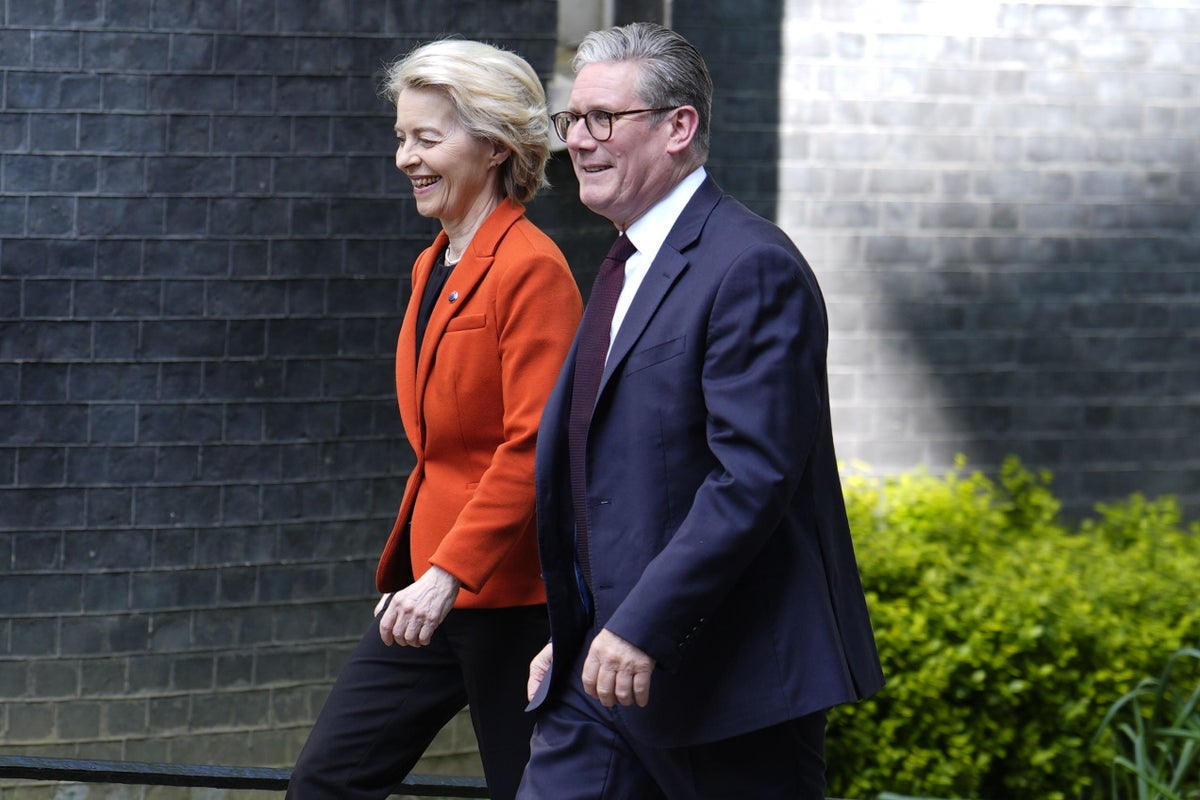Sir Keir Starmer is locked in a £1bn standoff with the EU over university tuition fees as he tries to get his much-vaunted Brexit reset deal agreed in time for Monday’s crucial summit.
The prime minister’s optimism that he is on the cusp of landing a “superb deal” with the EU was dealt a blow with just days to go after EU member states raised a series of objections to the European Commission’s draft communique.
The Independent understands that there is anger that the draft deal does not include big enough concessions from the UK on fishing rights and student fees, while a proposed cap on the number of under-40s who could live and work in the UK and Europe under a time-limited youth mobility scheme is too low.
They also appear to be pressing for Britain to accept the authority of the European Court of Justice (ECJ), as first reported in the Financial Times.
But with chancellor Rachel Reeves struggling to balance the books and under mounting pressure to raise taxes or break her financial borrowing rules, the demand that EU students pay UK student rates at British universities is a problem for Labour.
With UK universities having between 75,000 and 95,000 EU students over the past two years and overseas student fees ranging from £12,000 to £40,000 compared to £9,535 for UK students, it is understood that the gap in funding for UK universities could be around £1bn if such a deal were agreed.
Former education secretary Alan Johnson has already raised concerns about Britain’s “world-class universities” being “under threat” through controls on migration, with many struggling to raise enough money to stay afloat.
While universities have already warned that they could go bankrupt, a UK government spokesperson has insisted ministers will negotiate “in the national interest”.
She said: “These are EU internal draft texts. No final agreement has been made. We are not providing a running commentary on our discussions with the EU; these are ongoing and cover a wide range of issues.
“We have been clear that we will always act in the national interest to secure the best outcomes for the UK.”
The last-minute row in the talks has echoes of the late hitches in trying to agree a withdrawal agreement after the EU referendum in 2016, before the UK finally left in 2020.
It came as France’s president Emmanuel Macron said the EU must “reshape and completely reinvent” the relationship with the UK post-Brexit.
Meanwhile, a senior figure in the UK government insisted that the deal, due to be unveiled on Monday at a summit in London, would be “superb”.
There was a warning that the new agreement would anger both Brexiteers and rejoiners but would include alignment to EU rules and regulations to ease trade barriers and a youth mobility scheme for 18 to 40-year-olds based on the one the UK has with countries such as Australia.
The reset deal has been touted as the third piece in a major shift on UK trade following deals this month with India and the US. They are seen as essential to Sir Keir’s plans for economic growth, and the prime minister has the Gulf states as his next target for a major agreement to unleash billions in investment.
But an EU diplomat told the Financial Times: “We are all unhappy with missing progress, especially on youth mobility … and how the British demand wide-ranging concessions without offering anything in return.”
Another told The Guardian that the proposed deal is “not sufficiently ambitious” on youth mobility numbers or fishing. Another said: “There is a feeling among a large group of member states that the balance between rights and obligations is not there yet.”
Another noted the importance of fishing, stating that it “is one of the building blocks of this agreement. It is not possible to imagine that we have a successful summit without a positive outcome on this issue,” a third diplomat said. “If you don’t have an agreement on fisheries, you don’t have an agreement on SDP [security and defence policy], you don’t have an agreement on migration. It has to be a win-win.”
Sir Keir is expected to meet European Commission President Ursula von der Leyen on the margins of the European Political Community summit in Albania on Friday.
It is understood that even landlocked EU states are angered by the refusal to allow for greater fishing in British waters, although it is understood that the UK offered a time-limited and renewable access scheme.
It is reported that the draft text also includes a “dispute resolution mechanism with an independent arbitration panel that ensures that the European Court of Justice (ECJ) is the “ultimate authority for all questions of EU law”.
The UK would be invited “at an early stage” to discuss proposed EU rules and would be part of the “decision shaping” process, but would have no vote or veto over changes.
But a UK government source said: “The ECJ role in arbitration between the EU and other countries is advisory. Any rulings are the decision of the independent arbitration court, not the ECJ.”

